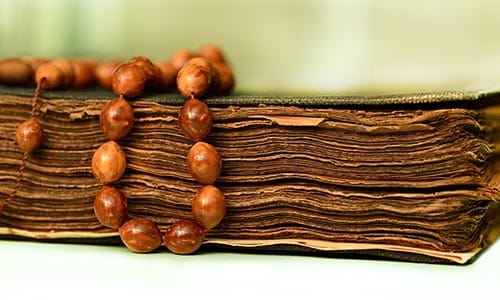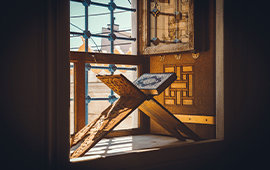Dua Against Affliction and for Important Concerns

We relate from the Ṣaḥīḥs of al-Bukhārī and Muslim that Ibn ‘Abbās reported that the Messenger of Allah used to say in times of difficulty: “There is no god but Allah, the Tremendous, the Clement. There is no god but Allah, Lord of the Mighty Throne. There is no god but Allah, Lord of the heavens and the earth and Lord of the Noble Throne.”
لَآ إِلَهَ إِلَّا اللهُ العَظِيمُ الحَلِيمُ، لَآ إِلَهَ إِلَّآ اللهُ رَبُّ العَرشِ العَظِيمِ، لَآ إِلَهَ إِلَّآ اللهُ رَبُّ السَّمَاوَاتِ وَرَبُّ الأَرضِ رَبُّ العَرشِ الكَرِيمِ.
“Lā ilāha illa-llāhu-l-‘Aẓīmu-l-Ḥalīm, lā ilāha illa-llāhu Rabbu-l-‘Arshi-l-‘aẓīm, lā ilāha illa-llāhu, Rabbu-s-samāwāti wa Rabbu-l-arḍi Rabbu-l-‘Arshi-l-karīm.”
We relate in the book of at-Tirmidhī from Anas , who reported that when something was difficult for him the Prophet used to say: “O Living and Everlasting, I seek help through Your Mercy.” According to al-Ḥākim, this hadith has a ṣaḥīḥ isnād.
يَا حَيُّ يَا قَيُّومُ بِرَحمَتِكَ أَستَغِيثُ.
“Yā Ḥayyu yā Qayyūmu bi-raḥmatika astaghīth.”
We relate from Abū Hurayrah, who reported that when the Messenger of Allah was worried about something he would raise his head towards the sky and say: “Glory be to Allah the Tremendous.” And when exerting himself in making dua he would say: “O Living, O Eternally Self-Sustaining”.
سُبحَانَ اللهِ العَظِيمِ. يَا حَيُّ يَا قَيُّومُ.
“Subḥāna-llāhi-l-‘Aẓīm. Yā Ḥayyu yā Qayyūm.”
We relate from the Ṣaḥīḥs of al-Bukhārī and Muslim that Anas said that the most frequent dua of the Messenger was: “O Allah, our Lord, grant us good in this world and good in the Hereafter and spare us the punishment of Hell-Fire.”
اَللَّهُمَّ آتِنَا فِي الدُنيَا حَسَنَةً وَفِي الآخِرَةِ حَسَنَةً وَقِنَا عَذَابَ النَّارِ
“Allāhumma Rabbanā ātinā fī-d-dunyā ḥasanatan wa fi-l-ākhirati ḥasanatan wa qinā ‘adhāba-n-Nār.”
We relate in the books of an-Nasā’ī and Ibn as-Sunnī, from ‘Abdullāh ibn Ja‘far who reported that ‘Alī said: The Messenger of Allah taught me these words and told me to say them whenever a problem or calamity befell me: “There is no god but Allah, the Noble, the Tremendous; Glory be to Him. Blessed is Allah, Lord of the Tremendous Throne. Praise be to Allah, Lord of the Worlds.” ‘Abdullāh ibn Ja‘far used to say this and then blow it over the feverishly sick (maw‘ūk). He also used to teach it to his daughters who were married to people not of their kindred (mughtaribah).
لَآ إِلَهَ إِلَّا اللهُ الكَرِيمُ العَظِيمُ، سُبحَانَهُ، تَبَارَكَ اللهُ رَبُّ العَرشِ العَظِيمُ، الحَمدُ لِلهِ رَبِّ العَالَمِينَ.
“Lā ilāha illa-llāhu-l-Karīmu-l-‘Aẓīm, subḥānah, tabāraka-llāhu Rabbu-l-‘Arshi-l-‘Aẓīm, al-ḥamdu li-llāhi Rabbi-l-‘ālamīn.”
We relate in the Sunan of Abū Dāwūd that Abū Bakrah reported that the Messenger of Allah said: The du‘ā’ for people in difficulty to say is: “O Allah, I hope for Your Mercy, so do not entrust me to myself for the blink of an eye. Put all my affairs right for me. There is no god but You.”
اَلَّلهُمَّ رَحمَتَكَ أَرجُو، فَلَا تَكِلنِي إِلَى نَفسِي طَرفَةَ عَينٍ، وَأَصلِح لِي شَأنِي كُلَّهُ، لَآ إِلَهَ إِلَّا أَنتَ.
“Allāhumma raḥmataka arjū, fa-lā takilnī ilā nafsī ṭarfata ‘ayn, wa aṣliḥ lī sha’nī kullah, lā ilāha illā Ant.”

